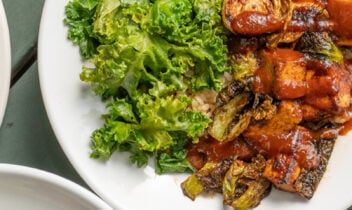TheBUZZ Eating products containing high fructose corn syrup is bad for you?
WHAT THEY’RE SAYING
High fructose corn syrup [also called HFCS] has been correlated with increasing the obesity rates in the United States over the last few decades.
WHAT WE KNOW
High fructose corn syrup is syrup made from corn. During the process, a group of corn syrups undergo enzymatic processing which converts the sugar from glucose to fructose. Fructose is sweeter than glucose. This is done to produce a desired level of sweetness. High fructose corn syrup is typically used as a sugar substitute and is ubiquitous in processed foods such as soft drinks, yogurt, breads, cookies, salad dressing, and some soups. The main reasons manufacturers use this in their products is because it is less expensive and it is easier to transport when compared to regular sugar.
So what’s all the hype about? There have been reports on the correlation between increased usage of high fructose corn syrup in products and the obesity rates in the United States over the past few decades. There are concerns that high fructose corn syrup can have more detrimental effects than table sugar. The Corn Refiners Association has taken extensive measures to suggest high fructose corn syrup is natural and has the same natural sugars as table sugar. Both sides have peer reviewed studies that support their claims.
HOW DO WE KNOW THIS?
In September 2008, the Corn Refiners Association launched several televised segments stating that high fructose corn syrup is made from corn, is nutritionally the same is sugar, and is fine in moderation. Their campaign has evidence that supports their claim that high fructose corn syrup is not a main contributor to obesity in comparison to other products.
Several other studies have shown evidence that suggests large quantities of fructose stimulates the production of triglycerides, which can induce insulin resistance. This is associated with the formation of type II diabetes.
There is evidence that supports both sides and the verdict has yet to be determined until more research has been done and reviewed.
OUR ADVICE
Stick with whole foods! This means foods that have little processing, such as fruits and vegetables! Since many of the ingredients in processed foods are not naturally occurring, it’s always better to eat something that is natural. However, since high fructose corn syrup is in a lot of processed products, it may be hard to avoid, especially if you’re on a budget (these products tend to be cheaper). If cost is an issue for you, check out our Fruits & Veggies on a Budget section for tips that’ll help you get the most for your money from fruits and veggies.
Fruits and vegetables are a nutritious alternative to many processed foods. If you are concerned about the fact that fruits and some vegetables contain sugar as well, remember that their sugar is naturally occurring sugar. Whole fruits and vegetables, whether fresh, frozen, canned, dried or 100% juice, have not been correlated with increasing obesity rates. Just make sure to read the food label on canned and packaged products to make sure they are not packed in sugar syrup. Also make sure to choose 100% juice with no added sugar! For more help on reading food labels, visit Understanding Food Labels.
All in all, remember that it is hard to avoid high fructose corn syrup, so just remember to consume it in moderation. Whenever you have the option of eating a whole food (such as fruits and vegetables) over a product with high fructose corn syrup, take the healthier option!
|


